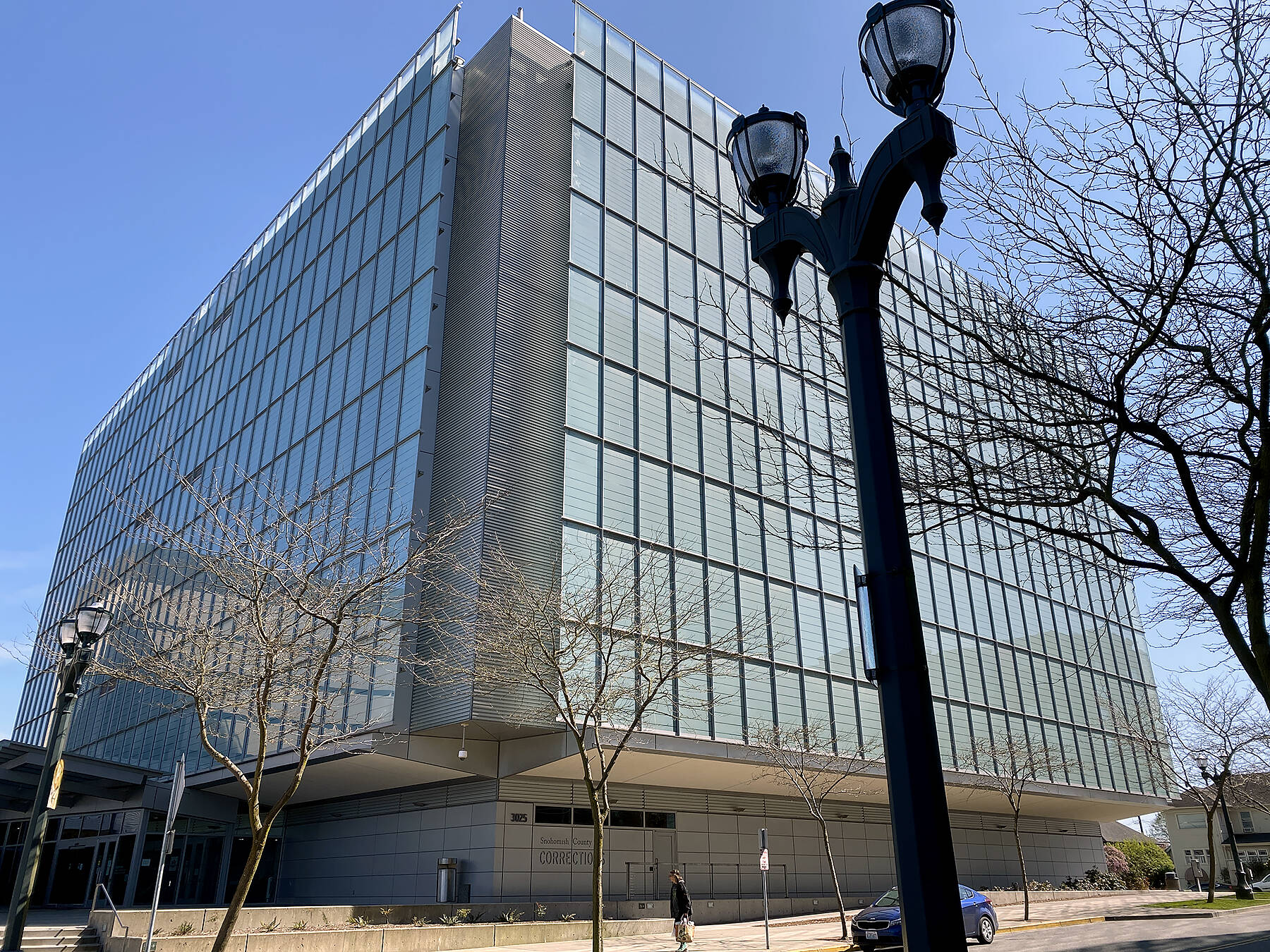EVERETT — Whatcom County wants to send dozens of inmates to Snohomish County’s jail as officials there face a ballooning incarcerated population.
This month, the County Council about 60 miles to the north approved a $1.2 million agreement to send up to 45 people to the downtown Everett jail. Their Snohomish County counterparts haven’t agreed to the contract yet.
The deal would last through 2023, at minimum, Whatcom County Sheriff’s Office Corrections Chief Wendy Jones predicted. The $1.2 million covers the rest of this year. Another $3.3 million in Whatcom County funds would need to be approved to cover next year, and the proposal includes the option for two more three-year renewals.
All of the incarcerated people would be awaiting trial on felony charges, Jones said. Of nearly 200 people at the Whatcom facility on Tuesday, Aug. 16, only two of them had already been convicted and were serving out a sentence there. And officials would be looking to send those considered “low-maintenance,” Jones said in an interview. That means people with minimal criminal history, low-level charges and lack of a disciplinary history.
“We don’t want to cause issues for Snohomish County officers,” Jones said.
If approved, jail staff would transport the inmates over the course of about six weeks.
The move comes as Whatcom County Sheriff Bill Elfo reports a rising population in a chronically overcrowded jail. Between January and June, the number of inmates jumped by almost one-third. Meanwhile, about one-fifth of the incarcerated people there have to be housed alone, reducing capacity by 35 beds. So staff resorted to housing people in spaces like a shower area and conference room.
Built in the 1980s, the Whatcom County Jail originally had capacity for 148 people. With remodels, that grew to 212. In 2006, a minimum-security work facility came online, adding even more beds. At one point in 2015, some 389 people were under jail supervision, according to the county.
Officials have been trying for years to get a new jail built. In 2015, Whatcom voters defeated funding for a proposed facility with over 500 beds. Two years later, they again voted against a somewhat smaller plan.
The Snohomish County Jail has room for over 1,000 people. In early March 2020, the jail population hovered around 800. By later that month, it had fallen to 560 as the pandemic quickly shifted booking priorities. And on average this year, about 48 percent of the total capacity has been occupied, said Courtney O’Keefe, a sheriff’s office spokesperson.
O’Keefe said the new contract won’t have much impact on operations. At the time of release, Whatcom County will pick up the people it had incarcerated at the Everett jail and take them back.
If the Everett jail population increases significantly after the contract is approved, Whatcom County might have to bring some people back north.
Given the financial benefit, Snohomish County Councilmember Nate Nehring called the proposal a “win-win.”
Not everyone agrees
In conversations with officials about the agreement, Starck Follis, director of the Public Defender’s Office in Whatcom County, made clear he was opposed to the move. He argued it’ll hamper attorney-client relations.
“I don’t like it,” Follis told The Daily Herald. “It’s going to make our job more difficult.”
Jones conceded that will be a challenge, but “we’re just stuck.”
Jason Schwarz, director of the Snohomish County Office of Public Defense, couldn’t remember a time local inmates were sent to institutions in other counties.
This won’t be the first time Whatcom County has needed to partner with another county to house inmates. In the past, some defendants have been driven from Bellingham to Kittitas County. But that hasn’t happened since the onset of the pandemic.
That, Follis argued, was even worse than the new Snohomish County proposal. None of his lawyers made the three-hour trek to Kittitas County to meet with clients. They talked only by phone or video conference. The public defender said it’s hard to know who else could be listening to those conversations in a facility where outside calls are recorded.
“It’s no substitute,” Follis said.
Whatcom County officials have been working with Snohomish County to set up a new system for private conversations between defendants and public defenders, Follis said. Still, it’s hard to build trust over the phone. So some lawyers will make the drive down to Everett to meet with clients.
It also moves defendants an hour away from their families and support systems, Follis said.
Whatcom County has some experience sending its incarcerated population here. For about 18 months from 2004 to 2006, Jones said, a couple dozen people were held in Snohomish County as a new in-custody work center was built up north.



